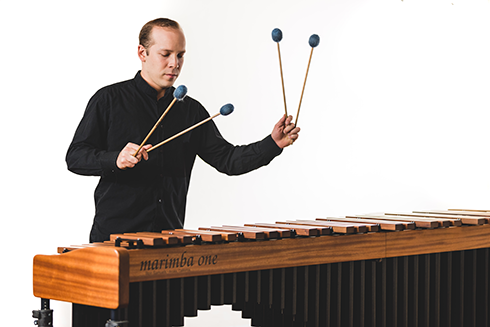by
Rhythm Scene Staff
| Oct 22, 2020

PAS Diversity Alliance: Where were you educated and who were your percussion teachers?
Cesar Gonzalez Cisnero: I was educated in the Orchestra System of Venezuela, better known as “El Sistema.” My main teachers, who I deeply appreciate, were Jose “Cheo” Cardenas in elementary and middle school, then José Alberto Marquez in college, and my master’s degree with the Puerto Rican percussionist José Alicea in the Simón Bolivar University of Venezuela. Thanks to “El Sistema,” I also received classes in summer camps and festivals with many great master percussionists, like Rainer Seegers, Wieland Welzel, Jhon Grimes, Fernando Meza, and Jerry Leake.
PAS DA: Describe your orchestral performing experiences.
CGC: I had the opportunity to be part of the Simón Bolivar Symphony Orchestra of Venezuela, where I developed my professional career, and had the experience to play with important conductors like Krzysztof Penderecki, Gustavo Dudamel, Alfredo Rugeles, Sung Kwak, Giancarlo Guerrero, Claudio Abbado, Christian Vasquez, Cesar Ivan Lara, and Roberto Tibirica, among others. In Ecuador, I played with the National Orquestra of Ecuador as an extra percussionist, under the direction of Alvaro Manzano and Andrea Vela.
PAS DA: What challenges have you faced, pursuing a career in orchestral performing?
CGC: The principal challenge is the high level of competition and the few positions available in the orchestras to a percussionist.
PAS DA: What challenges have you faced as musician during COVID-19?
CGC: Adapting to the constant use of technologies for broadcasting, recording, and capturing new audiences, and adapting spaces that have not been thought of as rooms for classes or presentations. All this translates into a hard blow to the economy because profits are few and investment in equipment is needed to face the new normal. It Is a difficult situation to deal with.
PAS DA: Please describe your work as a percussion educator.
CGC: My job is to make students fall in love with music through the world of percussion; then I try to choose the best way to teach based on their strengths and weaknesses. For me it is especially important that the students develop two components: group work and individual work. The percussion ensemble as part of group work is essential to develop the skills of teamwork, sound control, breathing, interpretation, and putting technical resources into practice. Individual work through a repertoire that can be put on stage in a prudent time, allows the student to reach the goal step by step.
PAS DA: How does your work as an educator relate to your career as an orchestral performer?
CGC: They are directly related, because as a professor of the National Superior Conservatory of Quito, we train percussionists to feed the different groups in the country, such as orchestras, bands, chamber groups, and different artistic projects.
PAS DA: What is your advice to players who want to pursue performing with an orchestra professionally?
CGC: Focus on understanding how technique is the best tool to express our feelings when it comes to playing music. Don’t fear going wrong, because the only way not to make a mistake is doing nothing, and nobody goes far doing nothing. Be patient, persistent, humble, and extremely disciplined.